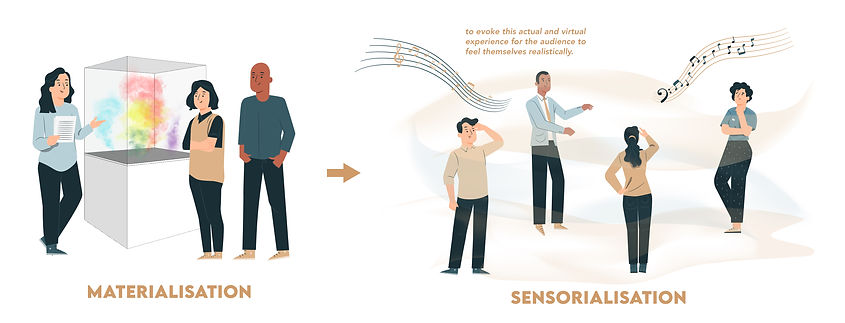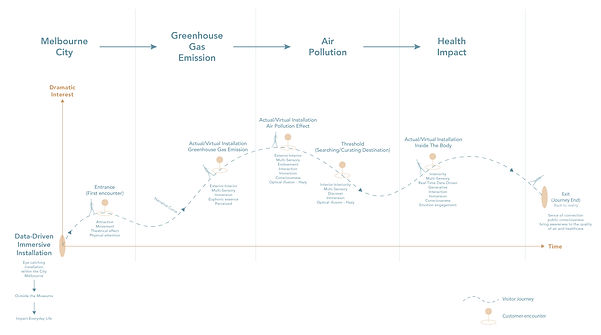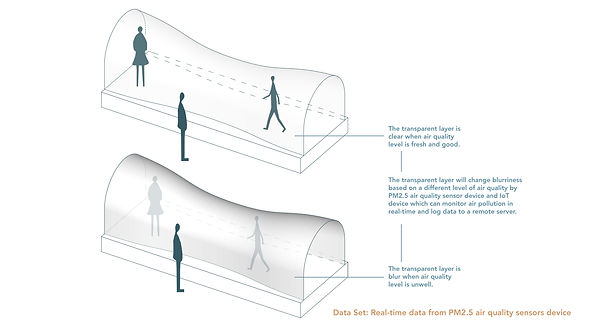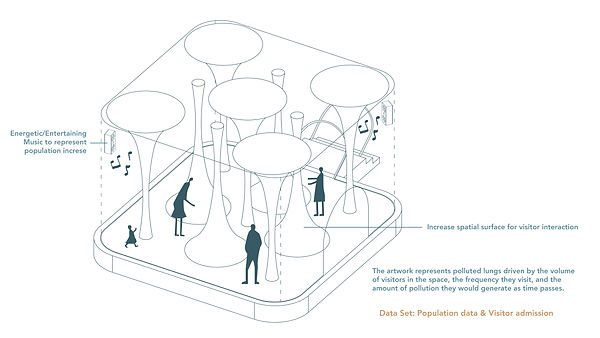dATA sensorialisation
2021 | The Lungs
//This series of Greenhouse Gas Emission data create an immersive environment through sensorialisation experience. This immersive installation is associated with the City of Melbourne to evoke an awareness regarding the current emission situation in Melbourne, which relates to air pollution and its potential impact on human healthcare.//

From Data to Visualisation
Data is a collection of text, numbers, and symbols with no meaning. Therefore, it is through the process of interpretation and the assignment of meaning that data becomes information. Data visualisation or sensorialisation present numbers and help the audiences understand, create, and experience our world. They reveal the hidden, explain the complex, and illuminate the obscure. Data should be presented accordingly based on the target, different visualization for the audience to receive the message instantly, compelling, engaging, and making connections and resonance with the public.

Design Process

Audiences still become immersed in story worlds, seeing the details, believing the actions and making connections between the events in the story and their own lives.
Multi-Sensory & Immsersive Ideas
This whole installation project enhances the audience's immersive experience, allowing a personal connection to the current issue to emphasize the deteriorating situation of Melbourne's environmental condition. It can be realised physically and virtually, offering a direct sensory experience through sight, smell, taste, touch, and sound, enhancing the visitors' and virtual environment experience, engaging the audiences emotionally. Therefore, in a virtual reality environment that uses narrative, the participant is doubly immersed.
"Data Dramatization, as opposed to data visualization, presents a data set with not only legibility or clarity but in such a way as to provoke an empathetic or emotive response in its audience."
~Liam Young

From Materialisation To Sensorialisation
The materialisation installation can simulate the realistic experience and lift human awareness regarding gas emission in the real world. Audiences rarely take it seriously if they observe externally without sensorialisation. This immersive installation with greenhouse gas emission data allows people to simulate the air pollution factually and drive the algorithm effect accurately, evoking this actual and virtual experience for the audience to feel realistic.

Conceptual Diagram

Conceptual Flow Chart

This simulation environment consists of
3 different spaces from the first space to the second space through the threshold, projecting 3 different scenarios of the current social scene:
“Daily life environment”, “Visibility”, “Dust & Dirt”.
Floor Plan
Axonometric
The whole installation is a lungs-like building form, a prominent design that immediately draws people's attention to the surrounding area. The 'lungs' installation could bring a visual statement of poor air quality to life. It is designed in a symmetric layout with the same outlook and overall outcome of the exhibition, yet two different programs run within both spaces to create an immersive journey of how greenhouse gas emissions impact human health. A transparent layer of threshold combines both spaces to connect the entire tour, making the invisible visible from the exterior for the walk pass audiences.

Dialy Life Environment - Conceptual Diagram
The first space represents the daily life environment; an artwork display illustrates invisible pollution that allows the audience to experience greenhouse gas emissions by different sectors and replicate the air quality, smell, and tactile impression of Melbourne city's condition. Smoke is the primary element in this virtual environment, using an actual colour powder to metaphor the gas emission, in reality, embracing and intensifying the blurriness of our contemporary cities, where the transparency of the modern movement cannot be achieved anymore having the audience experience themselves.
Secondly, audio as a virtual element enhances the audience's imagination based on background sound effects such as car horning, factory noise, or others. Thirdly, the space will circulates non-toxic that is air scented to simulate the smell of each gas's chemical fumes, the same volume of gas release at the outdoor environment yet compress into a small cubicle space to allow people to understand how the outside world has been living in with these volumes of emission gases. It leads to the current design of an algorithmic driven system that calculates the amount of emission gas in Melbourne city. Releasing coloured powder allows the audience to see in real, feel the volume and get to touch. The background sounds as virtual effect and the combination of air scented 'gases' will complete the sensorialisation experience, creating the immersive hybrid installation, a doubly immersed experience.

Artwork Display Illustrates Invisible Emission

Artwork Display Illustrates Invisible Emission

Artwork Display Illustrates Invisible Emission

Artwork Display Illustrates Invisible Emission
Dialy Life Environment

Real-time data Illustrates Air Quality

Real-time data Illustrates Air Quality

Real-time data Illustrates Air Quality
Visibility

Visibility - Conceptual Diagram
The threshold is a transition space; the visibility of the space layer, which represents the real-time data, illustrates the current air quality. It is a trigger point to get people to feel truly being in the body. The visibility level is a transparent layer that darkens and becomes opaque when higher pollution levels are detected. It is being detected with the PM2.5 air quality sensors device on the roof of taxi/uber, fully attached on the top of the car as they drive along the busy city roads to monitor air quality in real-time. It provides higher accuracy of data regarding the severity of real-time air pollution data in Melbourne. The data-driven installation is a significant impact and reminder for the visitors to decode the information by displaying the same air quality data that the cloud is visualising.

Dust & Dirt - Conceptual Diagram
Lastly, once the visitors walk past the threshold, the final space is an interactive artwork representing “Dust & Dirt” in the human body. The white rooms work as a canvas into an explosion of colour, with thousands of “dirt” attached over every available surface. The visitors transform powder from the body and touch the white room’s wall, creating colours and patterns based on the volume of audiences available in the space.
Furthermore, some energetic and entertaining music will play in this space to represent the increase of population in Melbourne, emphasizing the direct relationship of how population affects greenhouse gas emissions. The sensorial sound influences the human’s cognition and mental processes, emotional states such as mood, valence and arousal, and decision making. Interior design could play a role in responding to these contemporary
social, cultural, and ecological challenges through attending to the historical and philosophical division. The audience’s visit frequencies are closely equal to the amount of pollution they would generate as time passes, allowing them to experience and fully engage with the artwork within.

Interative artwork - Inside the body

Interative artwork - Inside the body

Interative artwork - Inside the body
Dust & Dirt

The Lungs Structural Diagram
Overall, this immersive installation represents human "lungs," having the visitors experience the gas emission in Melbourne city by getting "Coloured Powder" attached to their body. Once attached to the visitor's body, they virtually transform themselves into a 'Dust" that walks through the threshold, similar to humans inhaling the dust into their bodies. "Even if the air looks clear, it is certain that you will inhale tens of millions of solid and liquid particles, travelling from one side of the planet to the other. These ubiquitous specks of matter are known as aerosols, invisible to the eye, however not invisible to our lungs. The invisible visible threshold allows audiences to observe and evaluate exteriorly; humans cannot notice visually, but the lungs endure all the burden from environmental pollution. Entering the last cubicle creates the "interactive artwork" by wiping the colour powder on the wall, which metaphor does the actual "dirt" in reality attaching to our inner lung surface.

.png)



